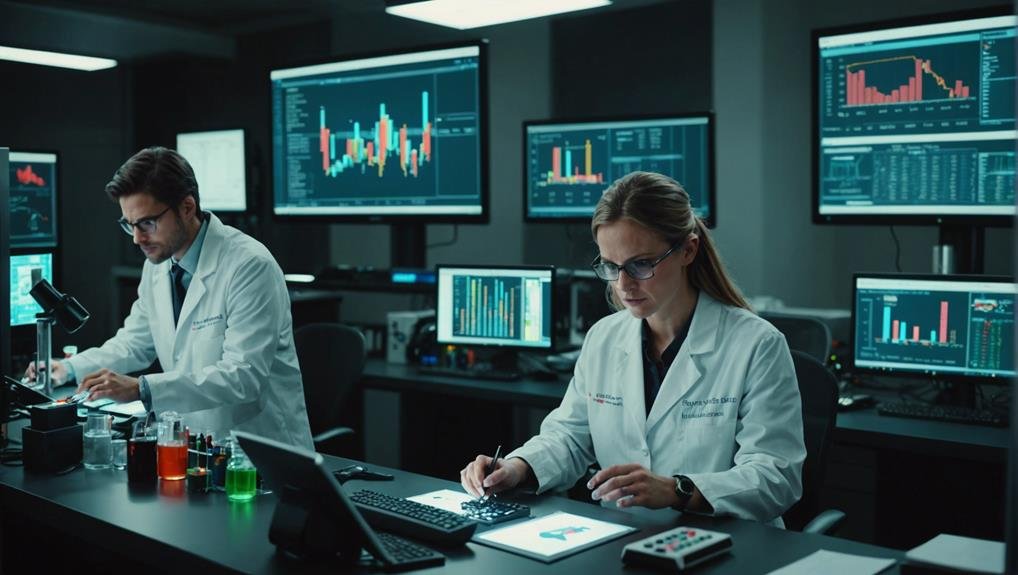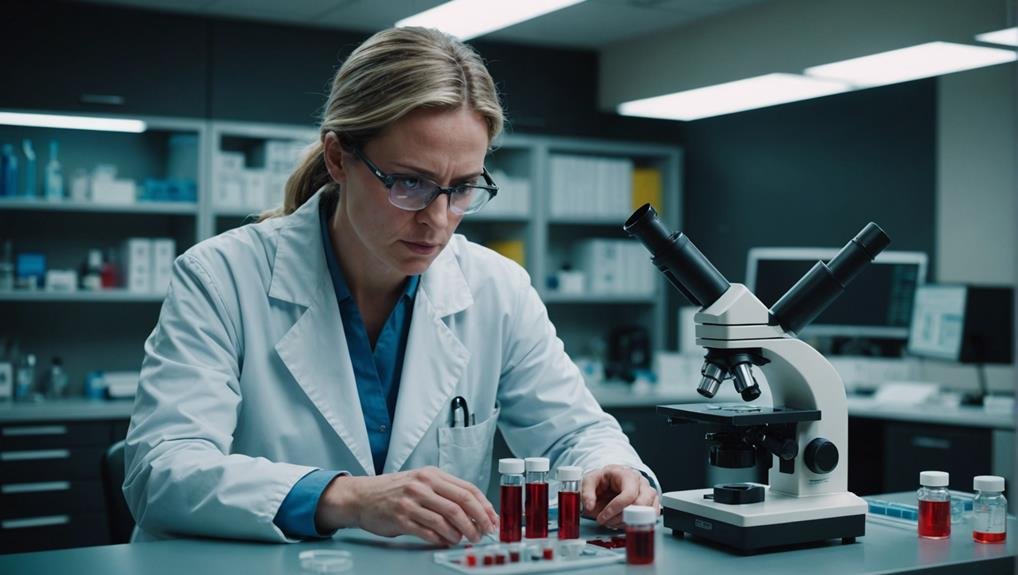Professional lab services play a crucial role in maintaining our health by providing essential screenings, monitoring health indicators, and aiding in the management of chronic diseases. These services are vital for early detection of conditions, adjusting treatments, and ensuring readiness for surgical procedures.
Some of the links in this article may be affiliate links. If you make a purchase through these links, we may earn a small commission at no extra cost to you. Thank you.
Additionally, labs help in identifying pathogens for disease control, conducting genetic testing for health risk assessments, diagnosing hormonal imbalances and allergies, and offering insights into organ function through specialized blood tests. Toxicology reports from labs also play a key role in making informed decisions in legal and workplace settings.
Understanding the specific uses of professional lab services is essential for making informed healthcare decisions and ultimately improving health outcomes. By utilizing these services, individuals can access accurate and timely results that are crucial for their overall well-being.
From routine screenings to specialized tests, professional lab services offer a range of benefits that contribute to better health management and disease prevention. Therefore, taking advantage of these services can significantly impact one's health and quality of life.
Routine Health Screenings
Routine health screenings are a vital component of proactive healthcare. Professional lab services offer early detection of conditions such as diabetes and certain cancers, providing valuable insights into our overall health. These screenings go beyond basic check-ups by assessing key health indicators like blood sugar levels, lipid profiles, and kidney function.
It is important to note that lab services operate under the Clinical Laboratory Improvement Amendments (CLIA), ensuring the accuracy and reliability of test results. By choosing CLIA-certified labs, we can trust the quality of the information we receive, as tests are conducted following strict guidelines.
Regular health screenings enable us to monitor our health status, track changes over time, and make informed decisions about our well-being. The information obtained from these tests empowers us to take proactive steps towards maintaining or improving our health. By incorporating these screenings into our routine, we can address potential health concerns before they escalate, promoting long-term wellness.
Chronic Disease Management
Routine health screenings are essential for managing chronic diseases like diabetes, heart disease, and cancer. Professional lab services play a crucial role in this process by providing vital information for monitoring disease progression, medication effectiveness, and potential complications. These lab tests offer timely data that guides adjustments to treatment plans, ultimately leading to better patient outcomes and preventing disease exacerbation.
Regular lab monitoring is crucial for early detection of changes in chronic conditions. For example, in diabetes management, frequent blood tests can reveal shifts in blood glucose levels, prompting quick adjustments to medication or lifestyle interventions. Similarly, for heart disease, lipid panels and other markers help assess the effectiveness of treatment plans.
Collaboration between healthcare providers and clinical laboratories is key to optimizing chronic disease management strategies. This partnership ensures the accuracy and timeliness of test results, enabling informed decision-making that enhances patient care. By utilizing clinical laboratory services effectively, healthcare professionals can better manage chronic diseases, improving health outcomes and the quality of life for patients.
Pre-Surgical Testing

Before undergoing surgery, patients undergo pre-surgical testing, which involves diagnostic procedures like blood tests and EKGs. These tests are crucial for assessing the patient's health condition and ensuring a safe surgical procedure.
Blood tests provide valuable insights into the patient's overall health, including blood cell counts and organ function. EKGs, also known as electrocardiograms, evaluate the heart's electrical activity to detect any potential cardiac issues that could complicate the surgery.
By utilizing clinical laboratory tests, healthcare providers can personalize the surgical approach based on the patient's specific health requirements. For example, if a blood test reveals a clotting disorder, preventive measures can be taken to manage the risk of bleeding. Similarly, if an EKG shows irregular heart rhythms, adjustments can be made to the anesthesia or closer heart monitoring can be implemented during the surgery.
Professional laboratory services play a critical role in pre-surgical testing by delivering accurate and timely results. This ensures that healthcare providers have the necessary information to make well-informed decisions, ultimately enhancing patient safety and optimizing surgical outcomes.
Thorough pre-surgical testing is a vital step in preparing for a successful surgery, as it helps identify and address any potential health issues that could impact the procedure.
Infectious Disease Detection
Accurate detection of infectious diseases is crucial for effective treatment and prevention. Clinical laboratory tests help identify pathogens such as bacteria, viruses, and parasites in patient samples, enabling timely and precise detection. This allows for prompt treatment initiation and helps contain the spread of infections.
Advanced technology in professional labs ensures high-precision detection of infectious agents, essential for proper disease management and treatment. Timely identification of infectious diseases also aids in preventing outbreaks, safeguarding public health.
Highly trained professionals in these labs play a vital role in accurately interpreting test results. Their expertise guarantees reliable and actionable information, especially crucial for managing serious infections where a quick and correct diagnosis can significantly impact patient outcomes.
Utilizing professional lab services for infectious disease detection supports public health surveillance and control efforts. Accurate tracking of disease incidence and spread enables the implementation of effective strategies to mitigate risks and protect communities.
Clinical laboratory tests are invaluable tools in the ongoing battle against infectious diseases.
Genetic Testing

Genetic testing plays a crucial role in identifying genetic mutations that can increase the risk of developing certain conditions based on our inherited genes. By analyzing our DNA, we can gain valuable insights into potential health risks and take proactive steps to manage them effectively.
One key application of genetic testing is in prenatal screening, where it helps detect potential genetic disorders in unborn babies. This early identification enables expectant parents to make informed decisions about their pregnancy and plan for future care accordingly.
Additionally, genetic testing is essential for assessing cancer risk by identifying mutations that may predispose individuals to specific types of cancer. This information empowers individuals to pursue preventive measures or personalized treatment options.
Furthermore, genetic testing provides essential information about hereditary disorders, influencing family planning choices and medical management decisions. Understanding our genetic predispositions allows us to make informed decisions for our health and the well-being of our families.
Specialized Blood Tests
Specialized blood tests are crucial for accurately diagnosing a variety of health conditions by providing detailed information about specific blood components. Unlike standard complete blood counts, these tests are essential for identifying rare conditions, monitoring chronic diseases, assessing organ function, and detecting genetic disorders.
Professional lab services are necessary for specialized blood tests to ensure accurate results and expert interpretation, which are vital for optimal patient care. These labs utilize advanced technology and expertise to handle complex analyses, enabling informed health decisions based on precise laboratory testing.
Utilizing specialized blood tests through professional lab services offers several key benefits. Firstly, they enable comprehensive diagnostics, helping to identify conditions that may be overlooked by standard blood tests.
Additionally, these tests are valuable for monitoring the effectiveness of treatments and tracking the progression of chronic diseases over time. They also provide detailed insights into the functioning of organs such as the liver and kidneys.
Moreover, specialized blood tests allow for personalized medical interventions tailored to individual health profiles.
Toxicology Reports

Toxicology reports from professional labs are crucial for detecting drugs or chemicals in the body, aiding in the diagnosis of substance abuse, overdose, or poisoning cases. These reports are vital in clinical settings as they assist healthcare providers in making well-informed decisions about patient treatment and care.
Utilizing advanced testing methods, professional labs accurately analyze blood, urine, or tissue samples to determine the presence of toxic substances.
Beyond clinical applications, accurate toxicology reports also play a significant role in legal proceedings, workplace drug testing, and forensic investigations. In legal cases, these reports serve as essential evidence to substantiate claims related to substance use or exposure.
In workplace settings, they help ensure compliance with drug-free policies, fostering a safe and productive environment for employees.
Hormonal Imbalances
Getting professional lab services is crucial for diagnosing hormonal imbalances accurately by analyzing hormone levels in the blood. These imbalances can lead to various symptoms like fatigue, weight gain, and mood swings, underscoring the importance of precise diagnosis for effective treatment.
Laboratory tests are vital in identifying the root causes of hormonal imbalances, such as thyroid disorders, diabetes, or reproductive issues. Prompt testing can help in devising suitable treatment plans tailored to individual needs. Utilizing professional lab services ensures that we receive dependable and precise results necessary for managing these conditions effectively.
Regular monitoring of hormone levels through lab tests enables us to optimize hormone therapy for patients. By tracking changes over time, we can fine-tune treatments to better address specific needs and enhance overall health outcomes.
Allergy Testing

Allergy testing conducted through professional lab services is crucial for pinpointing the specific allergens triggering our symptoms. Identifying these triggers, whether they're related to food, pollen, dust, or pet dander, allows for more tailored treatment plans and lifestyle adjustments. Professional lab services offer far greater accuracy compared to at-home kits, ensuring precise and reliable results.
Opting for laboratory-based allergy testing guarantees a thorough evaluation and expert interpretation of results, providing a comprehensive understanding of our allergies for effective management. The advantages of professional lab services for allergy testing are evident when compared to at-home kits:
When it comes to accuracy, professional lab services excel with high precision, while at-home kits offer only moderate to low accuracy. The reliability of results from professional labs is very high, whereas at-home kits may yield less reliable outcomes. Professional lab services provide a thorough evaluation, offering a detailed analysis of our allergies, unlike the limited insights provided by at-home kits.
By choosing professional laboratory services for allergy testing, we gain a clearer understanding of our allergic responses. This clarity is essential for developing personalized treatment plans that address our unique needs effectively. In contrast, at-home kits often lack the precision and depth required for tailored strategies.
Opting for professional labs empowers us to make well-informed decisions about our health and well-being.
Conclusion
Professional lab services act as essential guides in our health journeys, offering valuable insights for various health needs. Whether it's for routine check-ups, managing chronic conditions, pre-surgery assessments, or identifying infections, these services play a crucial role in our healthcare.
By utilizing genetic testing, specialized blood work, and toxicology reports, we gain a deeper understanding of our health status. Additionally, hormonal and allergy testing can help address specific health concerns.
By leveraging these lab services, we can navigate towards optimal health, making informed decisions and staying proactive in our health management.

